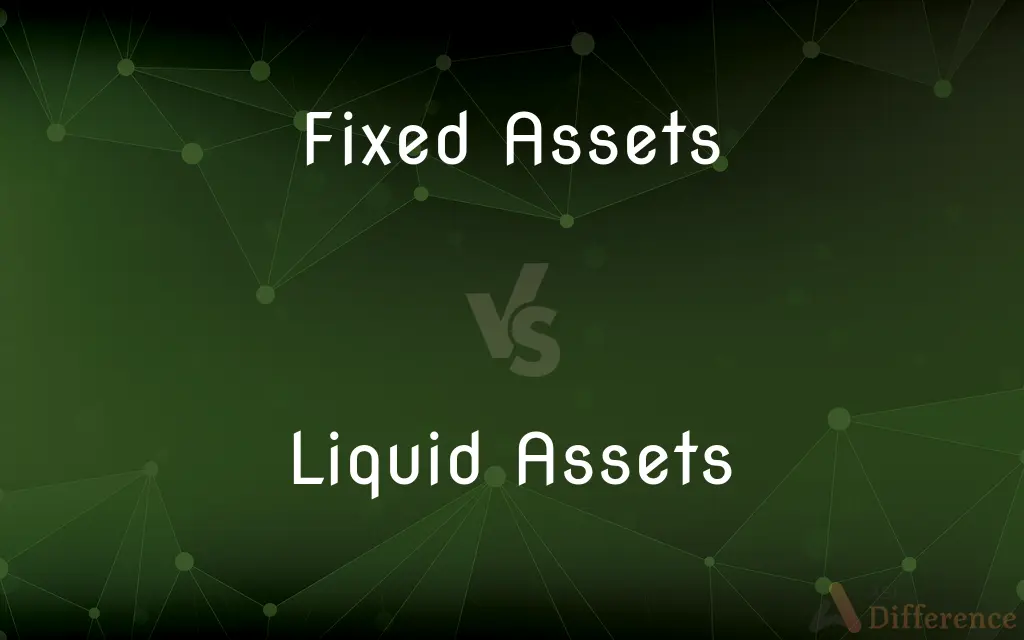Fixed Assets vs. Liquid Assets — What's the Difference?
By Tayyaba Rehman — Published on January 1, 2024
Fixed assets are long-term tangible assets used in business operations, like machinery and buildings, while liquid assets are easily convertible into cash, such as stocks and bonds.

Difference Between Fixed Assets and Liquid Assets
Table of Contents
ADVERTISEMENT
Key Differences
Fixed assets, also known as non-current assets, are tangible assets used in a business's operations and have a useful life exceeding one year. Liquid assets are assets that can be quickly and easily converted into cash without losing value.
The value of fixed assets typically depreciates over time due to use and wear. In contrast, liquid assets, like cash and marketable securities, are more stable in value and can be quickly liquidated.
Fixed assets are essential for long-term business operations and include items like buildings, vehicles, and equipment. Liquid assets, such as cash, checking accounts, and short-term investments, are used to cover short-term liabilities and emergencies.
Accounting for fixed assets often involves considerations of depreciation, maintenance, and longevity. Liquid assets, on the other hand, are more about liquidity management and ensuring adequate cash flow for operational needs.
In terms of financial strategy, fixed assets represent long-term investment and commitment to a business's core operations. Liquid assets reflect a company's ability to meet immediate financial obligations and manage short-term financial risks.
ADVERTISEMENT
Comparison Chart
Nature
Long-term, tangible
Easily convertible to cash
Value Over Time
Depreciates
Generally stable, quickly accessible
Examples
Buildings, machinery
Cash, stocks, short-term investments
Use in Business
Used in operations, long-term investment
Cover short-term liabilities, emergencies
Accounting
Involves depreciation and maintenance
Focused on liquidity and cash flow
Compare with Definitions
Fixed Assets
Assets that depreciate over time.
The new company vehicles are classified as fixed assets.
Liquid Assets
Used to meet short-term obligations.
The company's liquid assets were used to quickly pay off a short-term loan.
Fixed Assets
Essential for business operations.
Fixed assets like equipment are crucial for production.
Liquid Assets
Assets easily converted into cash.
Our liquid assets, including cash and stocks, ensure financial flexibility.
Fixed Assets
Long-term tangible assets used in business.
The company's manufacturing plant is a significant fixed asset.
Liquid Assets
Valuable for emergency funds.
We maintain sufficient liquid assets to handle unexpected expenses.
Fixed Assets
Represent long-term investment.
Investing in fixed assets is essential for our business expansion.
Liquid Assets
Essential for liquidity and cash flow.
Managing liquid assets is key to maintaining good cash flow.
Fixed Assets
Includes property, plant, and equipment.
Our fixed assets list includes buildings and machinery.
Liquid Assets
Includes cash and marketable securities.
Our liquid assets portfolio mainly consists of government bonds and cash reserves.
Common Curiosities
What's an example of a fixed asset?
Machinery used in a factory.
What defines liquid assets?
Assets that can be quickly converted into cash.
Why are liquid assets important for a business?
They ensure the company can cover short-term liabilities and emergencies.
Do fixed assets include intangible assets?
Typically, no; fixed assets are usually tangible.
Is equipment leasing a fixed asset?
Leased equipment is not usually classified as a fixed asset.
Are government bonds liquid assets?
Generally, yes, due to their marketability.
Can fixed assets lose value?
Yes, they depreciate over time.
Is cash a liquid asset?
Yes, it's the most liquid asset.
What are fixed assets?
Long-term tangible assets used in business operations.
Are stocks considered liquid assets?
Yes, as they can be quickly sold for cash.
Can real estate be a fixed asset?
Yes, if it's used for business operations.
How do liquid assets help in financial management?
They provide flexibility and liquidity for operational needs.
How are fixed assets recorded in accounting?
They're recorded as long-term assets with depreciation.
Can a company have too many liquid assets?
Excess liquid assets might indicate underutilization of resources.
Is inventory a liquid asset?
It's less liquid than cash but can be converted into cash relatively quickly.
Share Your Discovery

Previous Comparison
Rye Whiskey vs. Scotch
Next Comparison
SMS vs. BBMAuthor Spotlight
Written by
Tayyaba RehmanTayyaba Rehman is a distinguished writer, currently serving as a primary contributor to askdifference.com. As a researcher in semantics and etymology, Tayyaba's passion for the complexity of languages and their distinctions has found a perfect home on the platform. Tayyaba delves into the intricacies of language, distinguishing between commonly confused words and phrases, thereby providing clarity for readers worldwide.














































